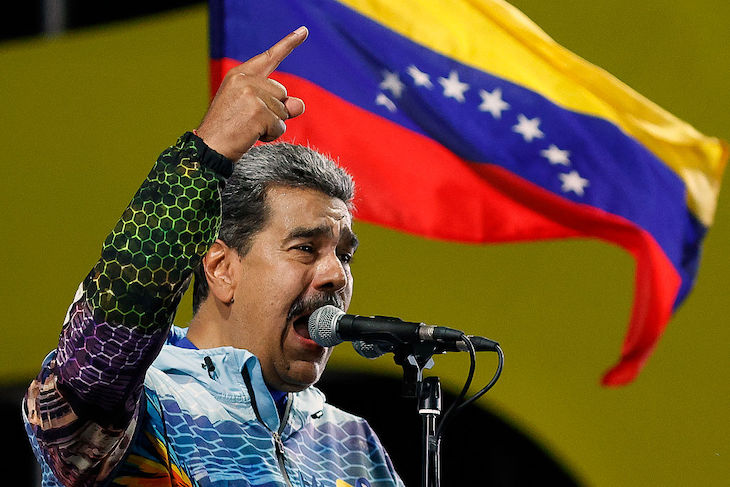For someone widely believed to have lost a presidential election just a year ago, Venezuela’s Nicolás Maduro is looking remarkably defiant – and still firmly in power. Maduro has just pulled off another patriotic spectacle – a choreographed homecoming of Venezuelan migrants with flags, cameras, and emotional reunions. This followed a deal with the Donald Trump administration that secured the return of 252 Venezuelans from CECOT, El Salvador’s notorious mega-prison.
Trump has breathed fresh political oxygen into a regime many thought was on the brink
Maduro cast himself as a protector, bringing his people home from what he called “concentration camps,” with the regime launching an investigation into alleged abuses. For Maduro, the deal was a political win – and one delivered by his longtime adversary. But this wasn’t a one-off victory.
Despite Trump’s bombastic rhetoric, the President’s policies – from hardline migration measures, deportation deals and even sanctions – have paradoxically given Maduro room to maneuver. They’ve breathed fresh political oxygen into a regime many thought was on the brink, helping him survive.
In the lead-up to the Venezuelan presidential election on July 28, 2024, Maduro faced his toughest challenge yet. After years of economic crisis and corruption, the country was desperate for change. Jubilant crowds packed opposition rallies across Venezuela, cheering María Corina Machado and her stand-in, Edmundo González, after the regime banned her from running. But hours after polls closed, the regime-controlled electoral council declared Maduro the winner – without releasing results. Opposition tallies from voting machines, later verified by independent experts, suggested González had won by a landslide.
Although bruised by an election defeat – one he’s never admitted – Maduro remained unbroken. He cracked down on protesters, journalists, politicians – seemingly anyone questioning his alleged “win.” Masked agents entered homes or snatched people from the streets, accusing them of conspiracy and terrorism.
When Donald Trump won the 2024 presidential election in November, many Venezuelans hoped for renewed pressure on Maduro to accelerate regime change. Trump’s first term had seen harsh sanctions and an antagonistic relationship, with the men sometimes trading insults. Trump called Maduro a “Cuban puppet,” while Maduro dubbed Trump a “racist cowboy.”
Instead of adding salt to Maduro’s electoral wounds, Trump’s early policies have paradoxically helped soothe them. Over the past decade, around 8 million Venezuelans have fled their country, driven largely by economic collapse. By the time Trump took office in 2025 there were 600,000 Venezuelans in the country – many who had risked crossing the treacherous Darien Gap gap jungle to get there – but some segments of the US population demanded stronger measures against incoming migrants.
Trump pledged to deliver voters exactly what they wanted. Cracking down on the influx of Venezuelans was key to his strategy. He ramped up immigration enforcement, conducting raids that targeted undocumented Venezuelans in major US cities – and often citing efforts to dismantle the Venezuelan gang Tren de Aragua. He also announced plans to roll back Joe Biden-era protection, Temporary Protected Status (TPS,) which has given some Venezuelans the right to live and work temporarily in the country.
Maduro has seized on Trump’s crackdown and dealmaking to boost his regime. He’s staged glossy propaganda around a visit to Venezuela by US envoy Ric Grenell and elaborate homecomings from those deported from the US – including the well-known case of a two-year-old girl separated from her parents at the US-Mexico border, later reunited with her mother at the presidential palace.
These carefully-orchestrated displays feed into Maduro’s long-standing effort to present himself as the nation’s protector. So much so that there’s even an action figure and cartoon based on him – “Super Bigote’– a mustachioed superhero who battles imperial enemies.
Trump called Maduro a ‘Cuban puppet,’ while Maduro dubbed Trump a ‘racist cowboy’
Maduro has been careful not to give up too many bargaining chips. While Maduro has just released ten Americans in the latest prisoner swap, as well as a reported 80 Venezuelans, within days, 20 new arrests of opposition figures were reported. More than 900 political prisoners remain behind bars. Human rights groups call it a “revolving-door policy.” Maduro may have handed over a few playing pieces, but he’s already replacing them.
It hasn’t all been plain sailing since Trump’s return. The White House has recognized Edmundo González’s 2024 victory and sees Maduro’s rule as illegitimate. But the biggest blow – economically and symbolically – came when Trump reverted to his first-term favorite: sanctions. As well as individual sanctions against some regime members, by pulling Chevron’s Venezuela license and imposing a 25 percent tariff on imports from countries buying Venezuelan oil, Trump tightened the economic noose again. Yet in a twist, in the last few days it was reported that the US will allowed Chevron to resume limited operations, giving Maduro yet another lifeline.
While some opposition figures and economists believe that sanctions are necessary to hasten Maduro’s downfall, there are others who argue they have historically hit ordinary people harder than the regime. This has given him fresh ammunition for Maduro to bash the opposition with, portraying them as traitors to the nation for largely supporting sanctions. María Corina Machado recently called Trump “an ally of democracy” and of the Venezuelan people. “The measures he has recently taken, including increased sanctions, demonstrate this,” she said.
While Maduro courts diplomacy with one hand and deploys revolutionary rhetoric with the other, the opposition lacks that luxury. It can’t criticize Trump too harshly without risking key support, leaving it open to accusations of coziness with the US administration, who many blame for the suffering of Venezuelans abroad.
With Trump back on the scene, the road ahead remains anything but predictable. And while Maduro isn’t thriving – he is surviving. Trump, his policies and his love of dealmaking are helping him do just that.

























